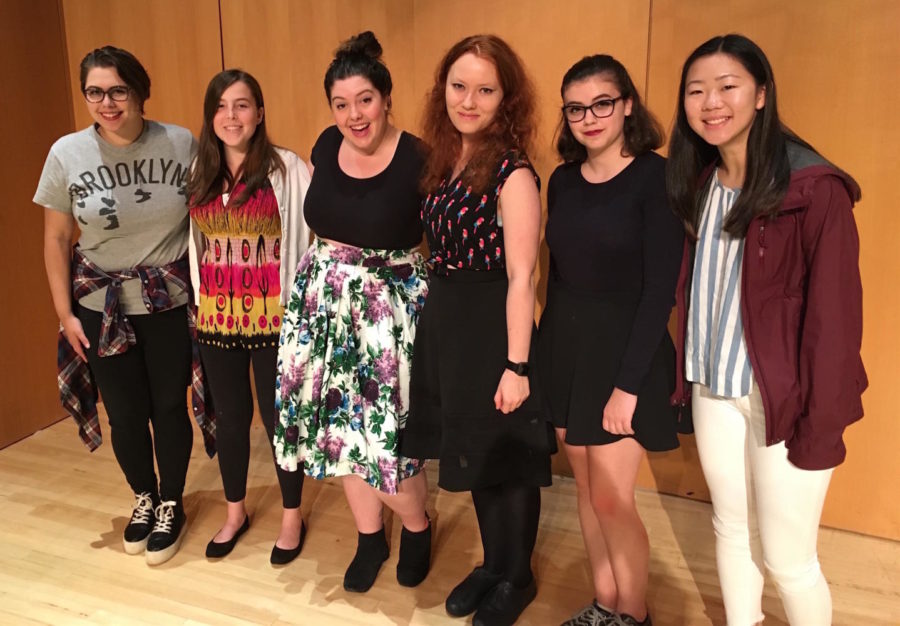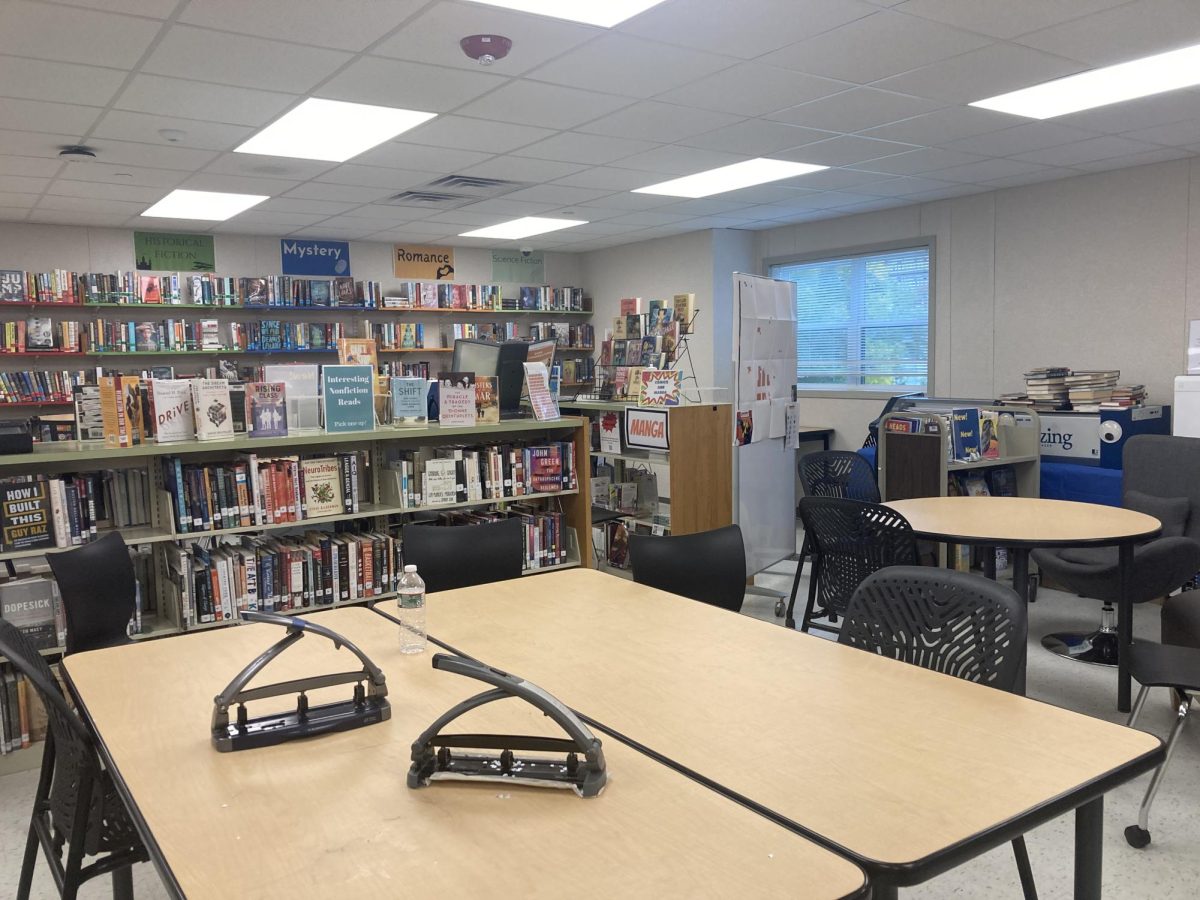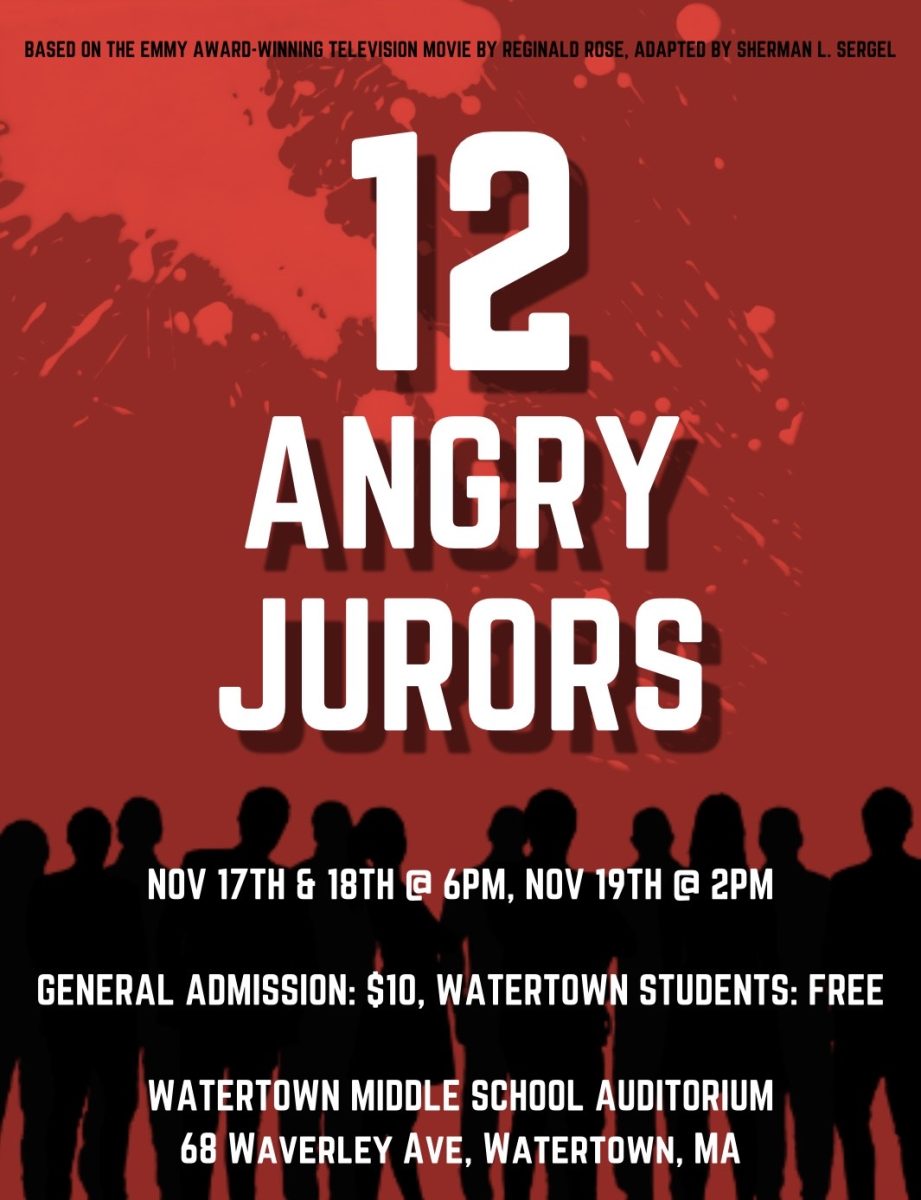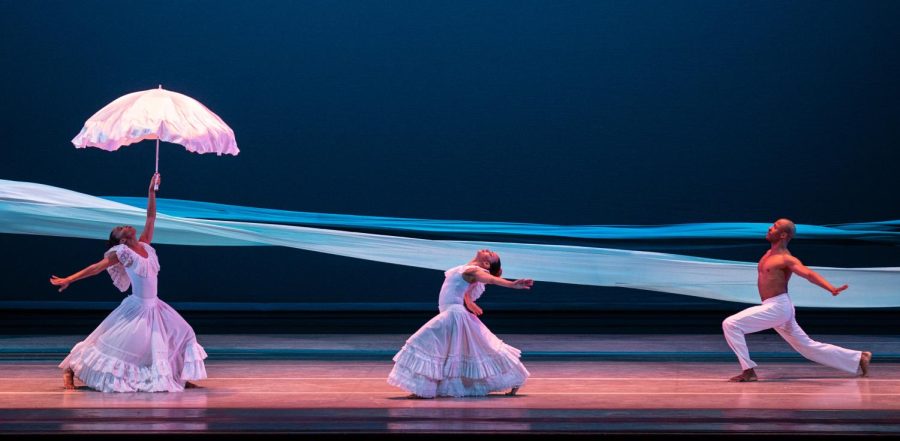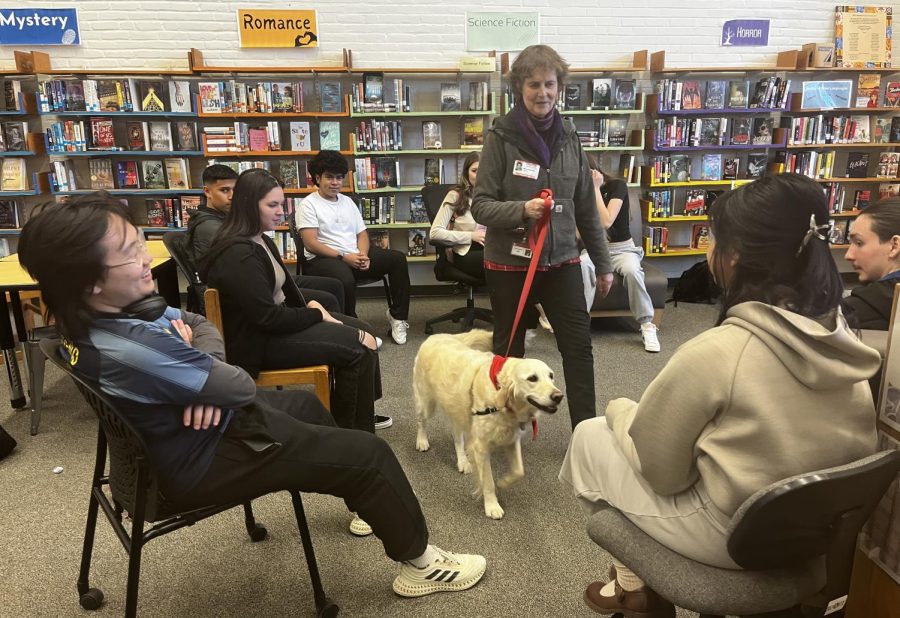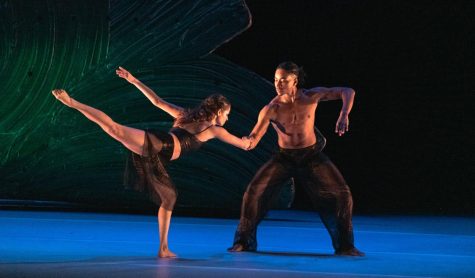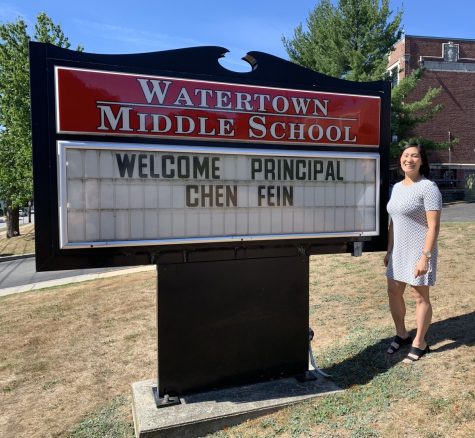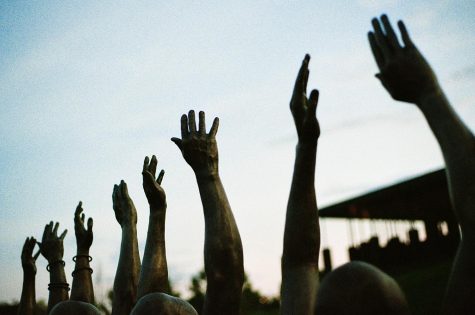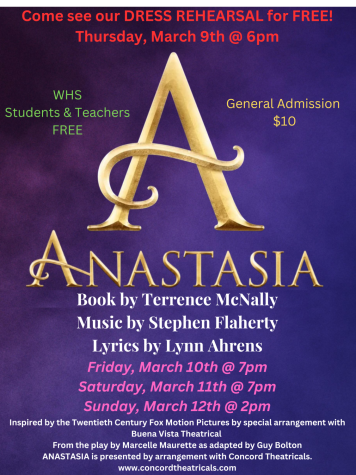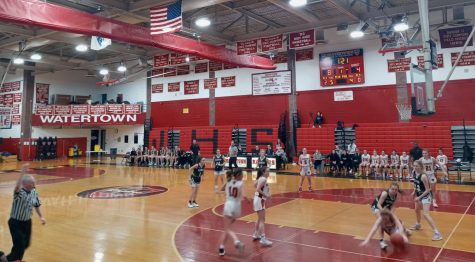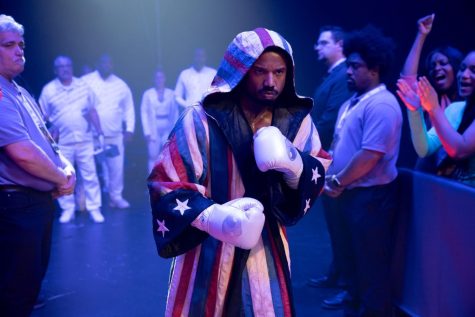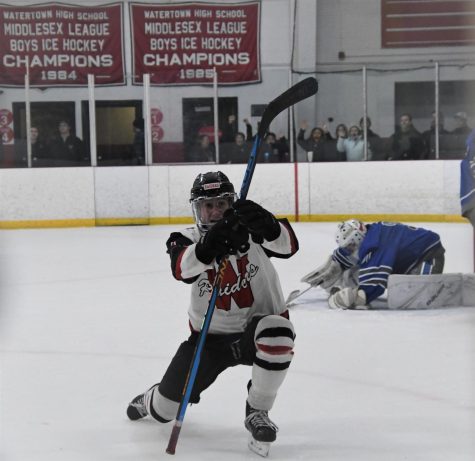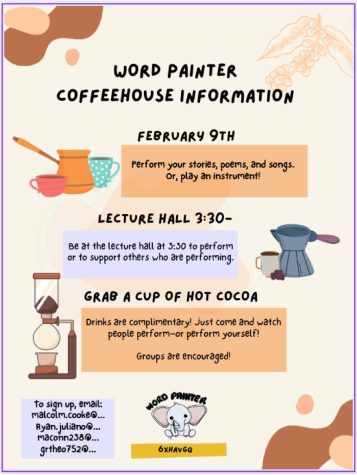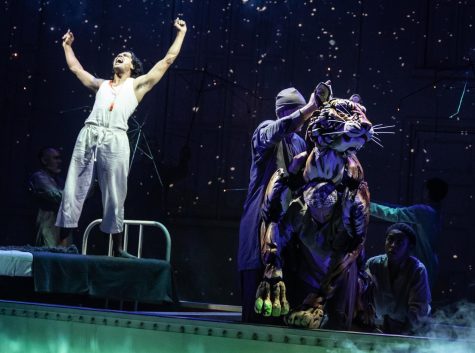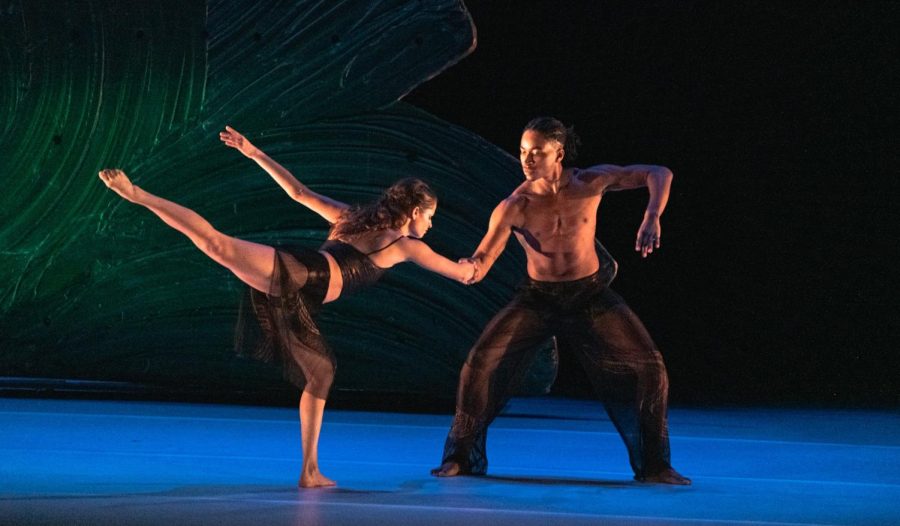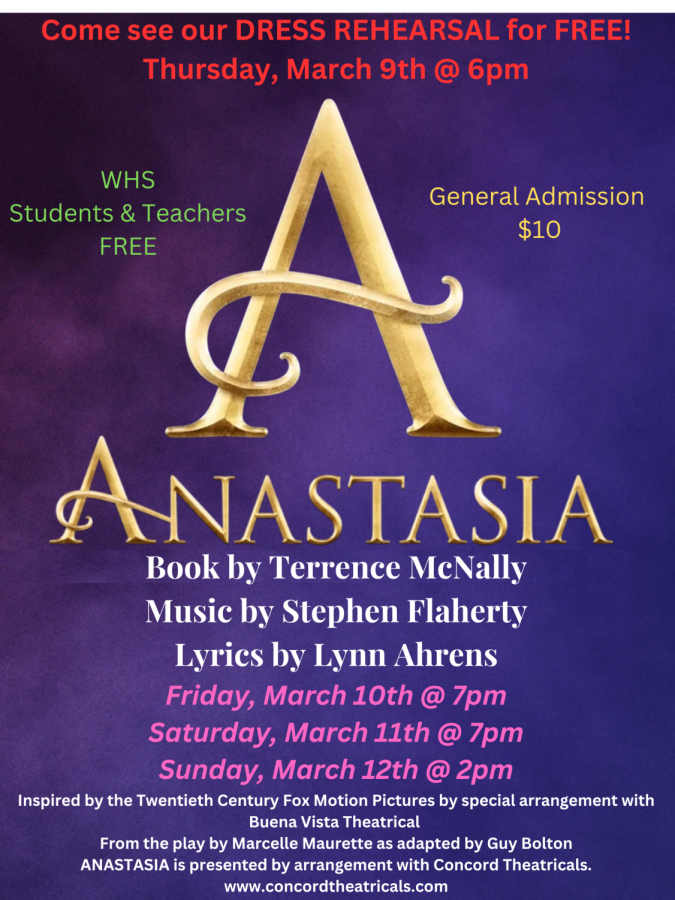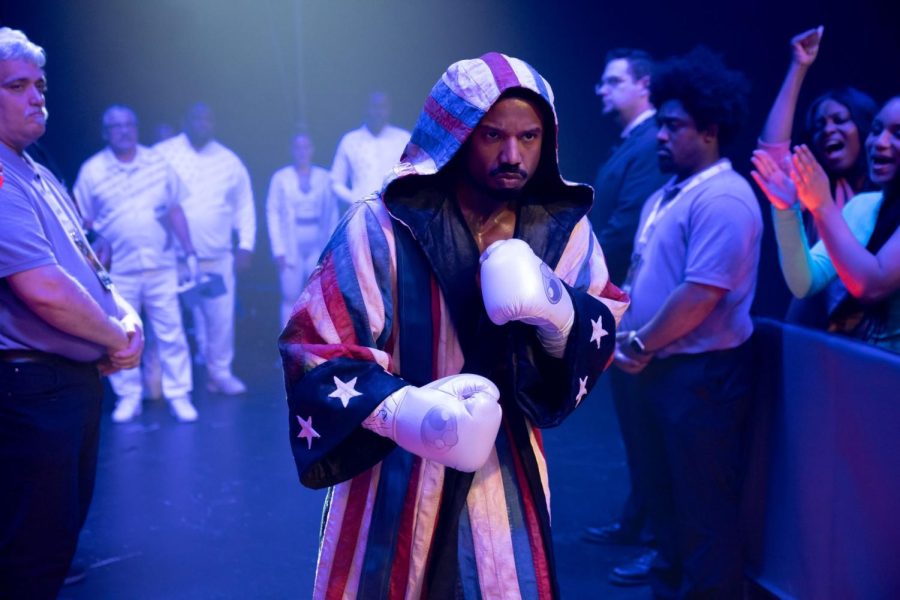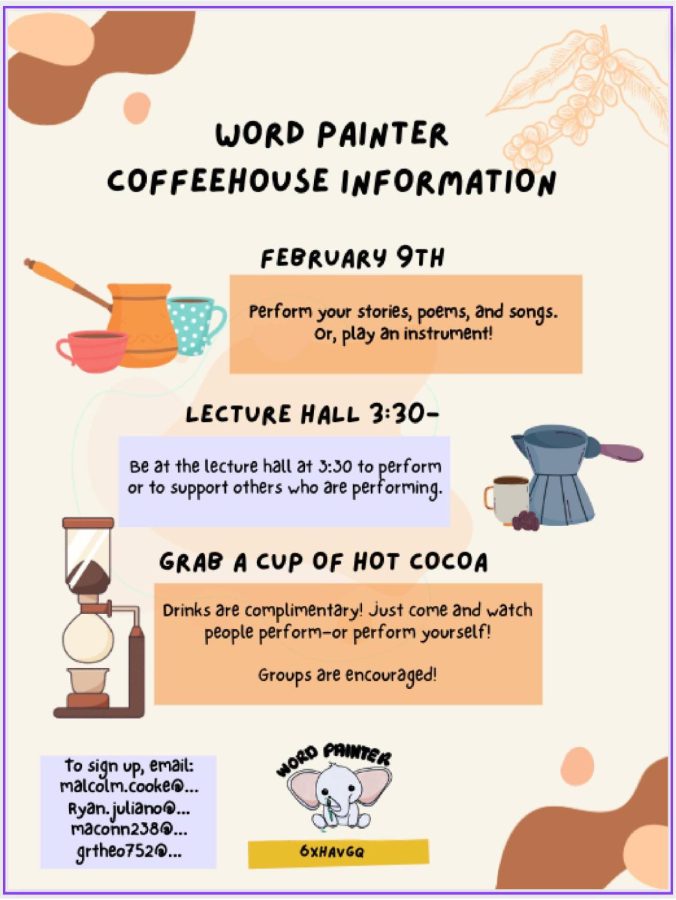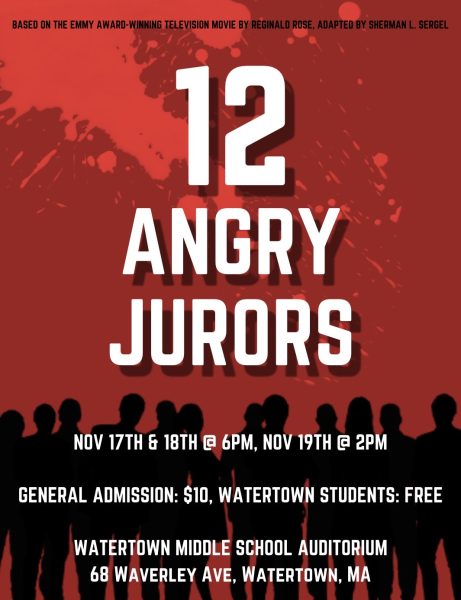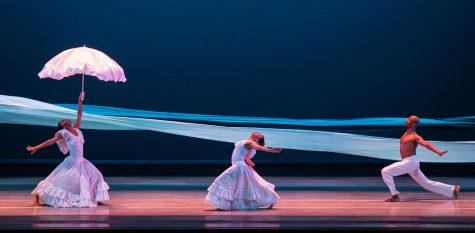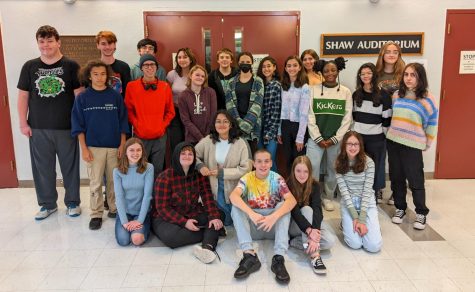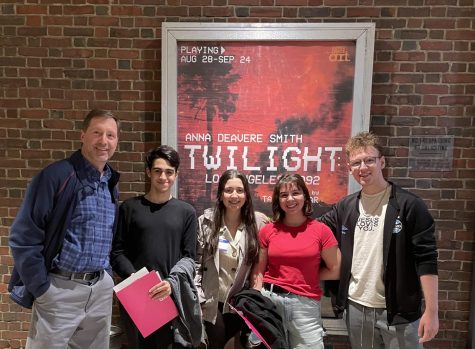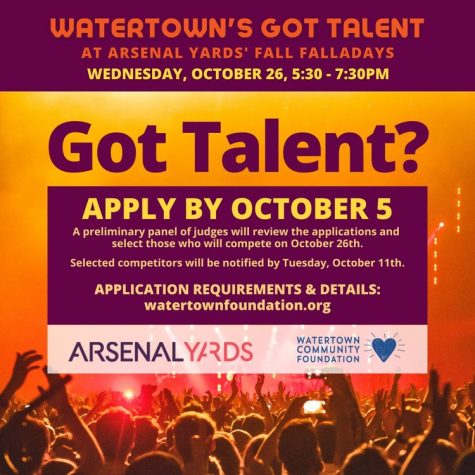Mary Lambert: Pretty complicated, pretty talented
Singer’s 14-city cross-country Everybody is a Babe tour will come to Sonia in Cambridge on Nov. 15
Singer Mary Lambert (third from left) poses with student reporters after a recent interview at Framingham State University. Her 14-city Everybody is a Babe tour will come to Sonia in Cambridge on Nov. 15, 2017.
November 13, 2017
Mary Lambert is a Massachusetts-born singer-songwriter, and her latest album, “Bold” is as unstoppably optimistic as she is.
In person, she appears confident and put-together, and after exchanging only a few words, one notices that she is easy to talk to, with an honest, subtle charm and a winning laugh.
She is excited about her Everybody is a Babe tour, which begins Oct. 21 in San Diego. The 14-city cross-country tour will come to Sonia in Cambridge on Nov. 15 before ending two nights later in New York.
She was recently heading to dinner in Boston as a prize for the the people who helped her Kickstarter campaign for “Bold”. Along the way, student reporters sat down with Mary at Framingham State University to ask her about her albums, her tour, and about the inspirations that drive her in songwriting and in life.
MARY LAMBERT: I think I’m a difficult artist to market because I’m pretty complicated. I think all people are complicated but I think I’m more outwardly complicated [laughs]. I’m just like, “I want to talk about sexual violence and also pop songs!” [laughs] … I have many dimensions, and so the next album I’m working on is pretty heavy. It’s kind of about shame, about how shame materializes itself and how it can be consuming, how to rid yourself of shame. There’s a lot of trauma talk in the next album, which doesn’t totally fit with a major label pop sphere. My shows are just crying fests, and they are also dancing fests, so I feel I’m great example of with great sadness and pain also comes great joy. — MARY LAMBERT
Q: Did you start the EP while you were at Capitol?
A: Yeah, it’s really song-based, which I know is like a Duh thing but it was some of them were songs I recorded before I went to Capitol, so some of them were songs that are five years old, and some of the recordings are very old. But I felt they were really fun pop songs that needed to be out on the world before I dove into this really heavy dark album. I wanted to throw people a last pop bone. [laughs]
Q: On the subject of ‘Bold’ in your own words, what story did you hope to tell through ‘Bold’?
A: There’s the behind-the-scenes story and then there’s also the outward story, so sort of behind the scenes for me was about me taking charge of my career and realizing that no one really knows what they’re talking about, and there’s all these sort of rules in the entertainment world and the pop world that I kind of wanted to break, and I was told over and over that I wouldn’t be allowed to produce what I made, and so, for me, it was just like, ‘Watch me!’ … So producing was a big part of it. I also have a song in there with my mom, which is something I always wanted to do. And then sort of the outward expression was really about joy of just being able to revel in yourself and being unabashedly queer and fat and like great [laughs] and being unashamedly so which I feel like you’re not really encouraged to take up those spaces especially as a female who is constantly being reminded that it’s important to be small and it’s important to be demure and quiet. So the cover is just me standing on a couch. That’s what I want. I just want to be loud and I wanted the colors to be bold and I wanted the vibe to be bold. There’s a lot of fun pop songs about loving girls and being able to embrace your complexity.
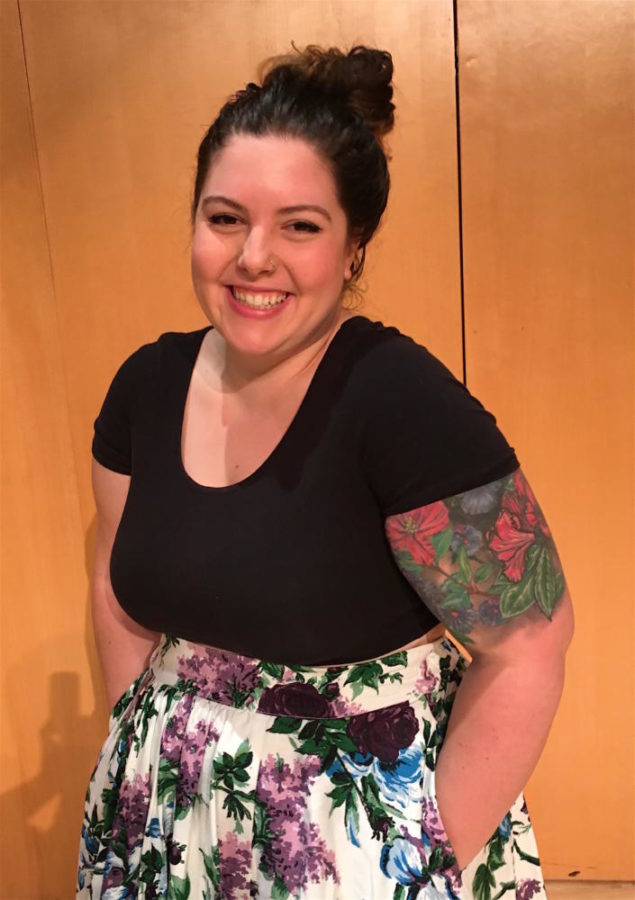
Q: I read in one of your interviews that you really didn’t want to use the word fat, you’d rather use words like curvy, and just now you’ve taken that word. Is that claiming the word going to be a lot in the net album?
A: I have gone through a huge transition in terms of my relationship to the word ‘fat,’ which I’m really glad you brought up because … The word fat is so broad. When you are actually talking about is lipid tissue and it can be a triggering word for a lot of people, so commonly used as a derogatory word for a lot of people, something that’s sort of synonymous with lazy or less value than somebody else, so my relationship to it previously had been: I’m plus-sized, because the only way that it’s a determining factor of between me and somebody else who isn’t plus-sized is clothing and that’s a great marker of like, I go into a different store, I don’t fit in this store, I’m a plus size. So that for me really functioned for a long time and then I realized how radical it was for someone to be, “No I’m fat!” and I really thought about it from a … Rachel Wiley has a poem where I think she’s on a date with this guy she’s like having a conversation and she’s like, ‘So I’m fat and blah blah,’ and he goes, ‘No you’re, not fat, you’re beautiful” And she’s like, ‘Why can’t I be both? Why are these things mutually exclusive?’ And I think a light went on for me of like, “I am, but it doesn’t mean that I have less value or less worth or that I deserve to die or something.” I think it’s a radical term, because I think it kind of turns it around on the other person that it’s “That’s not OK, why is that not OK?” So I appreciate it because it is radical. If you spend your entire life focused on how much money you’re going to make, like who’s going to be on the yacht with you? — MARY LAMBERT
Q: So you published a book of poetry which is kind of unusual for artists because usually they put those words into songs. Why do you want to do both?
A: I just got an offer on my poetry just like on my way here someone wants to publish it, make it more out in the world, so I’m just like on a high about my poetry right now! I’m like My Poetry’s SO great! [laughs] I discovered spoken word when I was 18, and it has really been a second home for me. When I started writing music I was like 5 or 6 years old, which for me songwriting was a form of survival, but I did feel in some ways songwriting was limiting, at least for me. I think in a linear way when I’m writing songs, in a very structured way of like the chorus fits here and the verses fit here and I enjoy rhyming in my songs , it just flows better it just feels better, so the rhyme scheme is important when I’m writing lyrics. And then when I found poetry — especially spoken word and performance poetry — it really relied on inflection and tone and delivery and you could say whatever the [expletive] you wanted to say, you could just say things as they were and that, for me, was really empowering. It felt freeing to experiment with in a different art form.
Q: How did you feel about having the opportunity to write the chorus for “Same Love”? What did that mean for you?
A: It was like a very divine moment. Something I really remember after getting that phone call is that I thought about when I attempted suicide when I was 18. I remember I had this nagging feeling with this handful of pills that I was ready to go and I had this voice that you are supposed to do something important. Of course, I listened so when I got that call it really felt like the Goddess was like, “Here you are! Here it is! You stuck around. Good job. Now you get to do this thing.” When I listened to the song I was just flabbergasted. I was just like, “This is my experience. I’m like a Christian lesbian. How specific does this song get to be to my experience?” So the writing process came very easily. It just felt gratifying.
Q: What lesson over the course of your career so far have you learned that everybody should learn at some point? It feels really empowering to know that I can just be exactly who I am and not just to be accepted for that but honestly be encouraged. Not a lot of artists get that experience. — MARY LAMBERT
A: I think i said it earlier, but nobody knows what the hell they are talking about 95 percent of the time [laughs] I think also no one can best tell you how to best use your voice, and I think that’s something that gets garbled in the process, and you define what success is for you. I feel like there’s a lot of these arbitrary roadmaps that say how you’re supposed to achieve something, whether it’s like “then you sign to a label and then you take all of this student loan debt” [laughs] “and then you become a doctor,” these sort of steps that become the equivalent of success. So by a lot of people’s standards I would be a failed artist in some way. I’m not on a major label anymore, I don’t want to tour all the time, and I don’t want that lifestyle anymore. And I don’t have a boat [laughs] or a beach house or something, but I am so much more fulfilled and feel understood and feel so much more connected to myself than I did three years ago. And that for me is what success is … If an artist spends their entire time or album cycle or five years dedicated to this one things and it goes down the toilet and they haven’t built anything else, where are they going to be? What is that going to feel like? And if you spend your entire life focused on how much money you’re going to make, like who’s going to be on the yacht with you? Are you going to have any close great relationships, or are you not going to build that? Are you going to hate yourself when you’re on the yacht? Are you going to be in good health?
Q: Can you speak on the importance of sharing things more of the things that are taboo that many people don’t talk about?
A: I think there’s a lot of fear that happens when you talk about heavier things, when you talk about trauma or sexual violence or even body image or things like that because you’re opening up a real vulnerable — often time a wound for people. I think that the more vulnerable the wound, the more important it is to talk about. At least my brand of humanity that I believe in I think that vulnerability is the key to empathy, and I think that empathy is the real key to connection, and I think that connection is what’s going to save the world. If I can come to the table first — which I’m happy to do so, I’m happy to be like I have a bipolar disorder, I deal with these issues, I’m a child of incest” — if I can come to the table in that way and have people meet me then I’ve made this beautiful connection that makes me feel more grounded to humanity and also let’s another person know 1) you’re not alone 2) you’re not a freak and 3) you can be a high-functioning joyful person despite it. Denice Frohman is a poet I love and she says, “Your trauma is probably not your fault, but your healing is your responsibility.” I think we have a responsibility to not let trauma cycle and to let it end with us. But it’s scary. It’s important to be safe and to feel safe when you do it and it can be real taxing for me to speak so openly and publicly about these really volatile issues sometimes and these traumatic things that happen to me. I do risk being triggered or going into an anxiety-induced coma on the couch. But for me the risk reaps a great reward and that is being able to facilitate something beautiful and witness it in a room full of people. I mean my shows are just crying fests, and they are also dancing fests, so I feel I’m great example of with great sadness and pain also comes great joy, because if you don’t have an understanding of what pain is or what sadness is you won’t have a calibration of what’s joyful and what true happiness and gratefulness really looks like. Not that I would wish intense trauma on anybody, but I do think that it gives you a unique perspective, and hopefully one could encourage others to see the world differently.
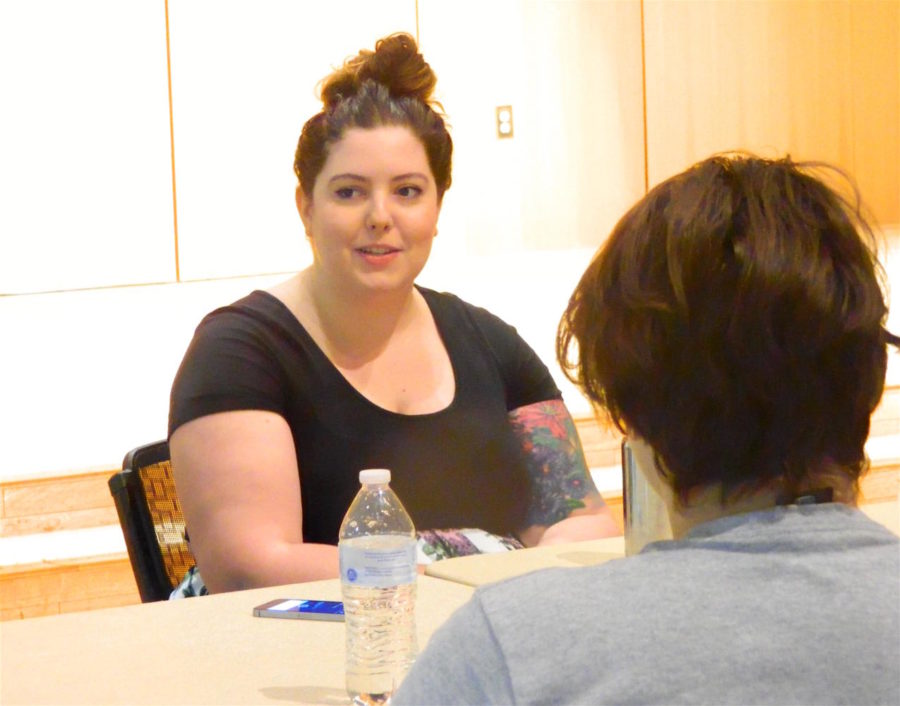
Q: What’s it mean to sing the song love is love with your mother?
A: It was really special! My mom is an incredible talented singer-songwriter, and that’s really where I first witnessed great songwriting and watching somebody really channel their own pain into an art form. … Being able to hear our voices match and to have that experience with my mom was something that I always wanted to be able to give and to share this gift of this life that I am somehow. There’s also something to be said for, when you achieve a certain amount of success or have a financial income, you can give your parents money and you can buy people things, but it’s really special. Because my mom’s the writer on that song, she gets her own royalty from my sales. So it just worked on all accounts. It was just sooo .. it was an amazing experience … And her name’s Mary Lambert, as well. … I’m Mary the fifth …
Q: On sort of the same note, how is it to represent what you represent? To be gay or to be fat or to be all things that come to mind when people think of you. I wanted to throw people a last pop bone [with the EP ‘Bold’]. — MARY LAMBERT
A: Um, Fun! [laughs] I really enjoy it. I mean there is this own sort of pressure of like, “Gosh, am I representing these communities well? Am I taking up space of someone that is under-represented could take? So that’s always scary to think. What I hope to I is share my platform as much as possible with people who are also marginalized or under-represented, but also understand that my voice is valuable, is warranted, is needed. But sometimes it can be scary! [laughs] like “Am I doing this good? Am I screwing up?” But I think in general it feels really empowering to know that I can just be exactly who I am and not just to be accepted for that but honestly be encouraged. Not a lot of artists get that experience.
Q: What’s in store between now in Christmas:
A: I’m going on tour in October and November. I’ll be in Boston in november, and I’m working on a book. I don’t know when it’s going to come out. And I’m working on the next album, but the the thing to look forward to is the shows and the tour. I’m very excited about the tour. I haven’t toured in like three or four years, and I’m just [singing] “I don’t have to answer to anybody.” I’m a nerd. I love camping and outdoor things … so we’re going camping for part of the tour [begins singing] with a fun trailer [end singing]. I’m excited.
Q: What about marriage?
A: Yeah! Hell, yeah! I mean that’s just inevitable. It’s very soon.
Q: Do you have any advice for young artists?
A: So many things to say to that. As I said before I think following your own voice and your own journey is priority one of questioning the status quo. Be nice to everybody. You don’t know what the security person at that crappy venue is going to be doing in two years… Be kind. I feel there’s a lot of people who don’t get gigs honestly because their name gets circled around because this person was really entitled or felt better than us.
(For more information about Mary Lambert and her tour, go to http://marylambertsings.com/.)
–Oct. 13, 2017–
